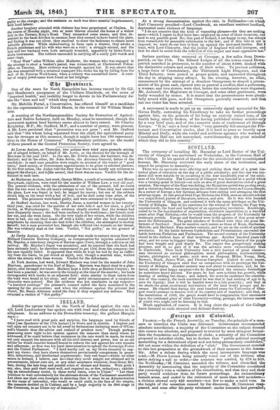SCOTLAND.
The ceremony of installing Mr. Macaulay as Lord Rector of the Uni- versity of Glasgow was performed on Wednesday, in the Common Hall of the College. In his speech of thanks for the unsolicited and unanticipated honour, Mr. Macaulay reviewed the early times of the institution, and traced its progress to maturity— There was no spectacle more affecting and striking than that of a great his- torical place of education on the day of a public solemnity; and this day was ren- dered still more notable by its occurring in the four hundredth year of the exist- epee of the University. The University of Glasgow was founded at a period which was a turning-point in history—at once an Jere of great destruction and of a great creation. The empire of the East was falling, the Byzantine period was passing away, and a victorious Sultan was devastating the relics of classic times in Constantinople. In a corner of Europe a few German artisans were cutting and arranging the first printing-types. At this period lived Pope Nicholas the Fifth, once an obscure scholar magniticient patron of literature, science, and arts. He it was who founded the University of Glasgow, and endowed it with the same privileges as the Uni- versity of Bologna. But in his exertions for the revival of letters, the Pope was, unconsciously, the head and harbinger of an approaching revolution. Knowl called to be the handmaiden of superstition, overthrew superstition in a hun years after Pope Nicholas,—for he would trace the progress of the University by centenary periods. Europe and Scotland were in the agonies of that great move- ment the Reformation. The great scholars of Scotland were then the great Re- formers of Scotland. Need he mention such names as those of Knox, Buchanan, Melville, and Maitland. Pass another century, and we are in the midst of another revolution. To the battle between Catholicism and Protestantism succeeded the battle between Prelatism and Puritanism. The second century of the University closed in the darkest days of that troublous age. Another hundred years roll away, and we come to happier times. The civil and religious liberty of the people had been bought and paid dearly for. The empire was prosperously making progress, and in no part of it was the advance more extraordinary than in Clydesdale.. Then their University bore a rich harvest of great names— men renowned as natural philosophers, moral philosophers, mathematicians, jurists, philologists, and poets; such men as Simpson, Miller, Young, Reid, Stewart, Black, James Watt, and Thomas Campbell. Linked to such names, the University of Glasgow need fear no comparison with its prototype the Uni- versity of Bologna. Another century was now about to commence, and, he be- lieved, under most happy auspices—for he disregarded the ominous foreboding& he sometimes heard uttered. For years he had seen nothing but growth, w hearing of nothing but decay; and indeed, the more he examined the constitu- tion of this counuy, the more convinced he was that it had nothing of age in it, save its dignity; that it will be handed down to a late posterity ; and that in its shade the great academical institutions of the land would prosper and in- crease. He trusted that during the next hundred years the University of Glas- gow would continue to deserve well of its country and of mankind; and that, at the installation of 1949, the people would have to congratulate their successor!, upon the continued glory of their University—citing, perhaps, the famous name; of youth who might now be listening to him.
Much applauded, of course. It is long since the youth of the College have listened to such elevated and delicate flattery.


























 Previous page
Previous page